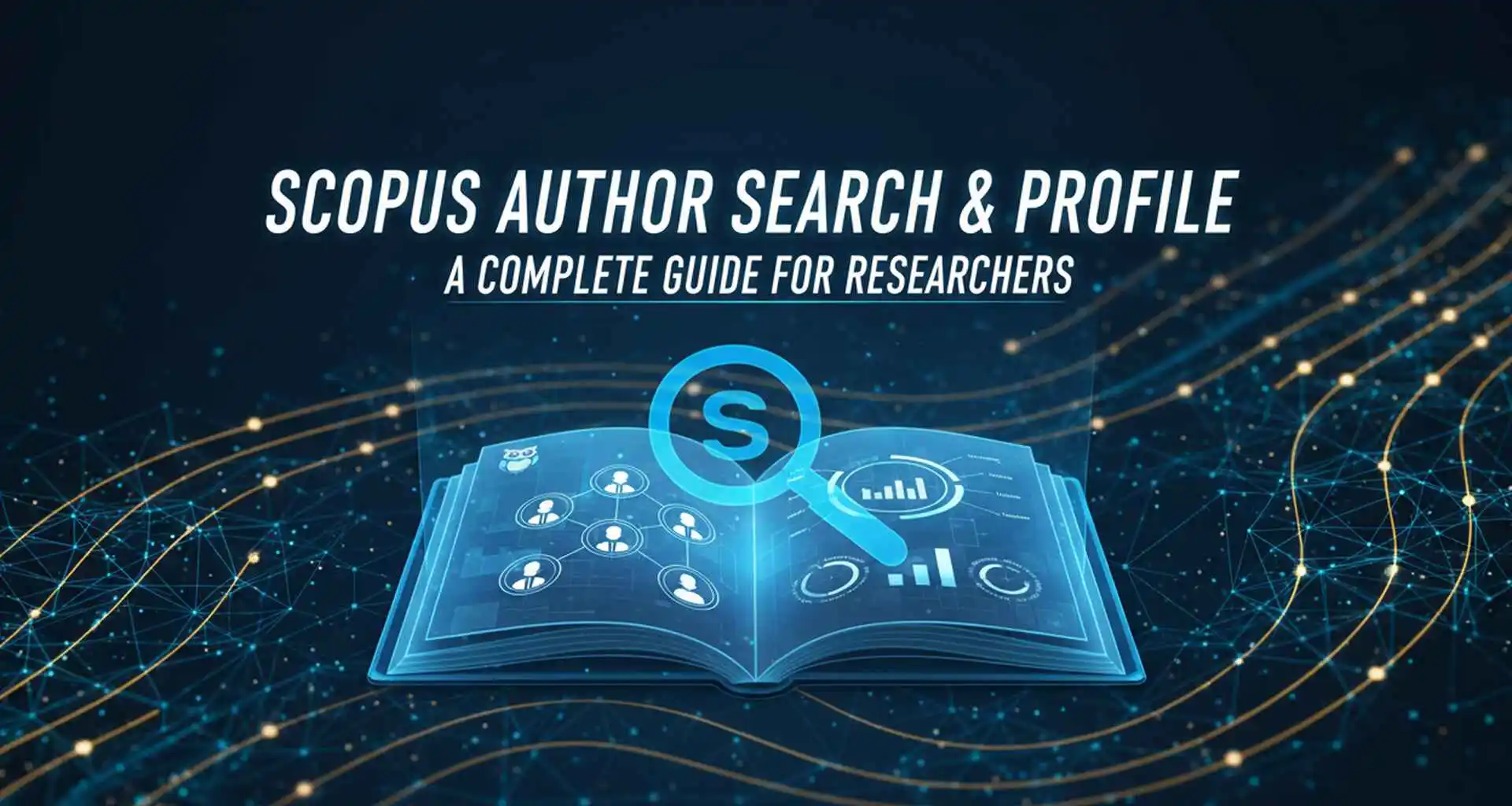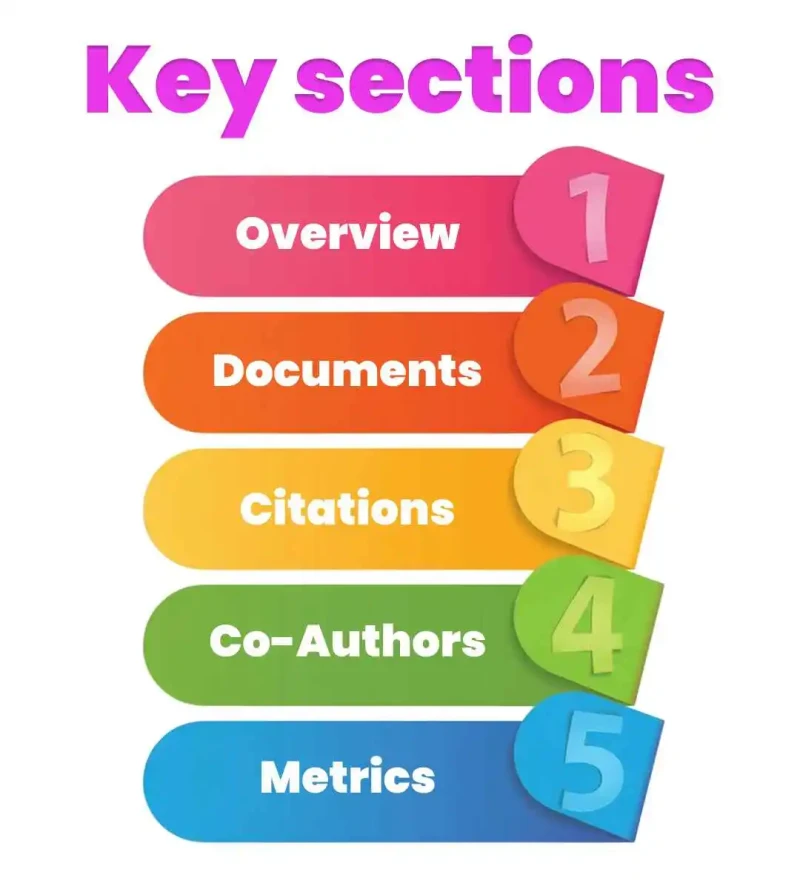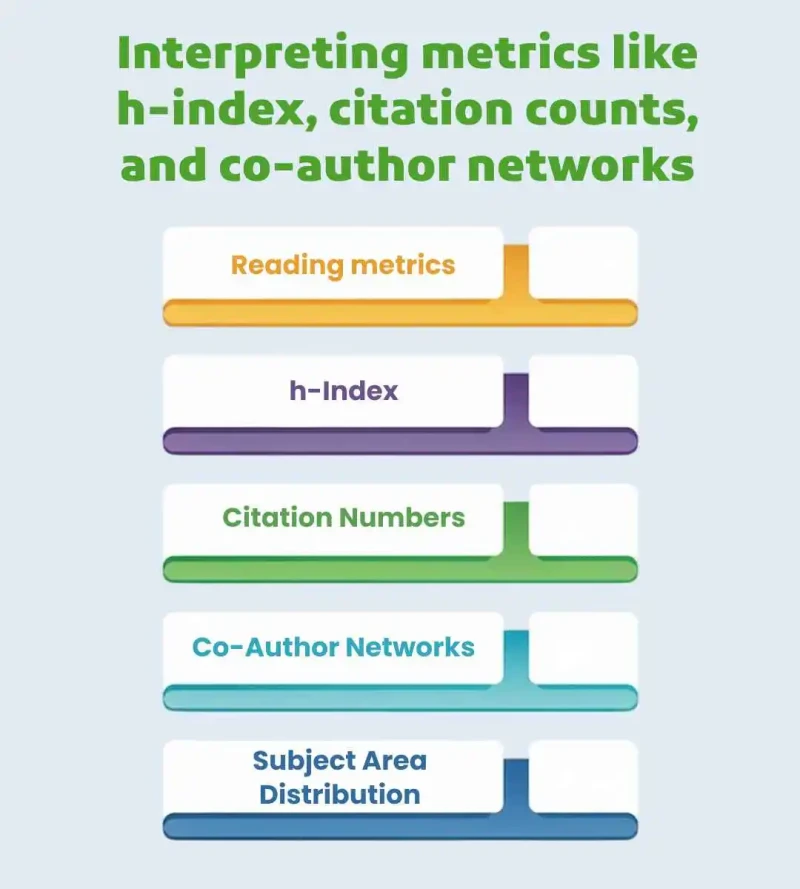Methods of Primary Data Collection in Research Methodology
Master the top methods of primary data collection in research methodology. Learn to use surveys, interviews, and experiments to gather original, high-quality data.

Luca
Being a researcher and an academic, your publications, citations, and collaborations need to be kept updated for career advancement. The Scopus author search functionality offers a solid mechanism to monitor your research output and that of fellow researchers. Along with a properly updated Scopus author profile, it assists in consolidating your publications, tracking citations, and promoting your academic work.
In this blog, you will learn to conduct successful author searches, construct and renew your profile, read such metrics as h-index and cite score, and get your research noticed. Through this blog, you will be able to utilise Scopus for increased visibility and cover the widest reach of research globally by publishing in Scopus.
Scopus is a global abstract and citation database with tens of millions of documents, conference papers, and book chapters in all scientific fields. Scopus enables researchers to search for literature, track trends, and quantify academic impact.
The facility of author search in Scopus is extremely helpful in identifying the correct author profile, even if there are common names or publications in more than one institution. Scopus author profile cleanses publications, monitors citations, and offers a co-authorship network and research output recommendation, giving a full picture of an author's research output.
By learning to make use of such tools, researchers are engaged in publishing in Scopus and are able to find strong collaborations, quantify research impact, and get noticed in the academic world.
Author ID is a permanent, never-changing identification assigned to each author in Scopus. It distinguishes between scientists of the same name and consolidates all their articles under one author. Author ID maintains your research monitored precisely, even if you change institutions, use other names, or work across countries.
According to your name, institution, and research area.
Automatically assigns existing publications to your account based on Scopus algorithms.
Merging publications between institutions or co-author groups.
Accurate tracking of publication and citation tracking.
Co-author team and research collaboration statistics.
Allows tracking of performance, grant proposals, and scholarly reporting.
Makes it easy to collect publications in the Scopus author search
Scopus author search enables researchers to acquire an author's publications properly, track citations, and verify scholarly credentials. Below is how to do it appropriately:
Log in to Scopus Author Search or log in to the institutional Scopus log-in.
Use first and last names for the best results. Where feasible, apply alternatives or variations of initials or middle names.
Apply the company name, research centre name, or university name to differentiate between two or more authors with the same name.
Apply correct scholarly disciplines like business, management, engineering, or social sciences to limit the search to your research field.
Scroll through a list of matching authors, cross-matching information such as publication titles, co-authors, and research fields to choose the right profile.
Click on an author's name to see all their publications, citation count, and collaboration record.
Scopus offers sophisticated filtering options to enable users to limit large search results and choose the appropriate author effectively:
Filter by publication year: Limit the results to a set range of years to highlight current or extremely significant research.
Filter by document type: Limit journal articles, reviews, conference proceedings, or book chapters by your area of research.
Filter by source publication title: Choose particular publication sources or journals to which the author often publishes.
Filter by location or institution: Filter authors according to where they are or according to where they have access through their institution.
Refine by discipline: Choose a particular school discipline such as business administration, marketing, or economics.
Apply filters sparingly combined: Use application of two or more filters at once at one time for a very specific and detailed author search result.
Scopus Author ID is the identity of the author who has all his publications tidily bundled and traced, and dispels confusion because of the same name. The benefits are:
Scopus allocates a Scopus Author ID to all automatically registered researchers and combines all their publications into one verified account.
Regardless of different misspellings of a single author's name across different publications, the ID keeps them aligned.
Provides all the statistics concerning an author, such as total citations, h-index, and coauthor networks.
Enables authors to post updates, merge profiles, or alter affiliation details through the Author Feedback Wizard.
Stable Author ID has the greatest visibility on Scopus, ORCID, and institutional repositories.
Shows co-authors, research networks, and focus by subject area for real-time analysis of research influence.
With Scopus Author ID and expert search filtering, an author can locate freely and efficiently data utilised appropriately, completely, and correctly.
A Scopus Author Profile gives a complete picture of the publication record of the research scholar. Each tab provides information regarding the author's productivity, impact, and collaboration:

Shows variations in the author's name, institutions affiliated with, subject fields, and Scopus Author ID. It is the summary page that is accessible at one's convenience.
Summarises all Scopus-indexed documents, such as journal articles, conference papers, and book chapters, all connected to citation numbers.
Displays total citation totals, yearly citations, and extremely cited articles—so that users can quantify influence and contribution to the literature.
Identifies collaboration patterns, displaying shared co-authors, institutions, and co-publications, which indicate research collaborations and academic networks.
Provides quantitative data such as h-index, citations, and number of papers that give a direct gauge of the exposure and influence of the author's research output.
The Scopus Author Profile has a direct association with the Scopus Author Search facility.
A profile is linked with a Scopus Author ID, thus offering assurances that any works it has indexed have been rightly brought together. This consolidation makes it simple for researchers to move from search results to sophisticated author analytics, offering proper identification and monitoring of citations.

Every Author Profile in Scopus provides decent indicators to measure scholarly performance:
Both quantity and quality are reflected; an h-index of h shows the author with h papers to have at least h cites. It is also symmetric.
Show total citations in all published material, illustrating the research visibility and impact of the author.
Illustrate collaboration patterns showing with whom the author frequently works, where they work, and in which topics of research.
Over-time publication pattern monitoring and most productive times or research focus area emerging identification guiding.
Show the multidisciplinary range and thematic speciality fields of the author.
Altogether, these Scopus Author Profile results enable researchers, institutions, and reviewers to measure scholarly accomplishment, monitor scholarly influence, and identify possible collaborations better.
Search Scopus Author Search: Visit Scopus Author Search and enter your name, affiliation, or subject category.
Search for Your Profile: Look at the list of profiles and verify through checking affiliation, subject category, and title of published papers.
Merge or Correct Profiles: In case of errors or duplicates appearing, use the Author Feedback Wizard to merge or correct your information.
Connect Your ORCID ID: Link your Scopus Author ID to your ORCID ID to receive synchronised updates.
Keep It Updated: Constantly check and update publications, affiliations, and citation information for accuracy.
Search for your profile in Scopus Author Search by name or affiliation.
Check information such as affiliation, subject category, and published works to ensure it's yours.
When you encounter incorrect information or multiple profiles, ask for corrections or merging through the Author Feedback Wizard.
Scopus processes and maintains your profile to ensure accurate publication and citation attribution.
Log in to your Scopus Author Profile and verify if any new publications are omitted.
In case omitted, complete a "Request to Add Document" form or contact Scopus Support.
Supply details like DOI, journal title, and publishing year to enable easy verification.
Ensure all publications are connected under your very own distinctive Scopus Author ID for an equalised and original record.
New refresh ensures your citation metrics (e.g., h-index and citation total) are up to date.
Having an updated profile raises awareness and credibility of your work among colleagues, institutions, and collaborators.
It facilitates academic appraisal, grant applications, and promotion processes with authenticated publication records.
Updated Scopus profile enhances overall research output and career profile.
Utilise Scopus Author Search to research a co-authorship network of an author, indicating frequent collaborators, institutions affiliated with, and collaborative publications.
Examine citation linkages to identify top researchers and collaboration groups in a research field.
Measure how collaborations impact publication reach and citation increase, assisting in quantifying an author's research impact and scholarly output.
Scopus enables users to create analytic publication numbers, citation records, and topic area profile reports.
Use trend plots to graphically visualise annual publication output and citation patterns.
Find the best productivity times, most-cited publications, and rising research areas in your field of study.
Export these results to CSV or Excel for further bibliometric analysis and institutional reporting.
Scopus Author Search statistics inform faculty performance review, promotion review, and grant proposals.
Quantities such as h-index, citations, and co-authorship trends offer quantifiable measures of productivity and influence of research.
Researchers and research funders use Scopus indicators to measure research quality, collaboration intensity, and publication visibility.
Having a suitably current Scopus profile enhances your scholar profile and increases research funding and recognition appropriateness
Integrate your Scopus Author ID with your ORCID to link publication data in an automated fashion. Such integration provides proper crediting of your works in the larger perspective and updates new publications in real time. It also consolidates your research identity in a way that makes your profile easily accessible to institutions and funding agencies.
Use the same middle initial and surname spelling in all publications. Variants can cause duplicate profiles or not have publications in Scopus. Verify your author name and affiliation before submission. Consistency allows Scopus to accurately give credit for your research and keep your entire publication record.
Use Scopus Author Search continuously to monitor your citations, h-index, and co-authorship network. Monitoring such statistics helps you recognise the collaboration patterns, measure your research visibility, and remain sensitised to building citations. Post such monitoring, you can plan future collaborations and maximise scholarly influence.
A Scopus Author Profile is an important asset for any researcher. It consolidates your publications, monitors citations, and shows your collaborations and scholarly visibility. From finding and verifying your author information to combining profiles, connecting ORCID, and keeping your information up to date, keeping your profile up to date means accuracy and visibility to the international research community.
Whether you require professional help in creating or enhancing your Scopus Author Profile, get in touch with us today to have your scholarly works properly presented and easily accessible.
Master the top methods of primary data collection in research methodology. Learn to use surveys, interviews, and experiments to gather original, high-quality data.
Don’t write your methodology without reading this. Learn why purposive sampling is essential for case studies and how to define your inclusion criteria. Url:purposive-sampling
Master the chapterization of thesis to ensure logical flow. Learn the standard academic framework for organizing research into a professional, approved document.
A practical guide to sentiment analysis research papers covering methodologies, datasets, evaluation metrics, research gaps, and publication strategies.
Master data analysis for research papers. Learn quantitative and qualitative methods, cleaning, and reporting standards to ensure your study meets journal rigour.
Want to impress your peers? Discover the best ways to condense your research, avoid common mistakes, and handle tough questions at any academic conference.